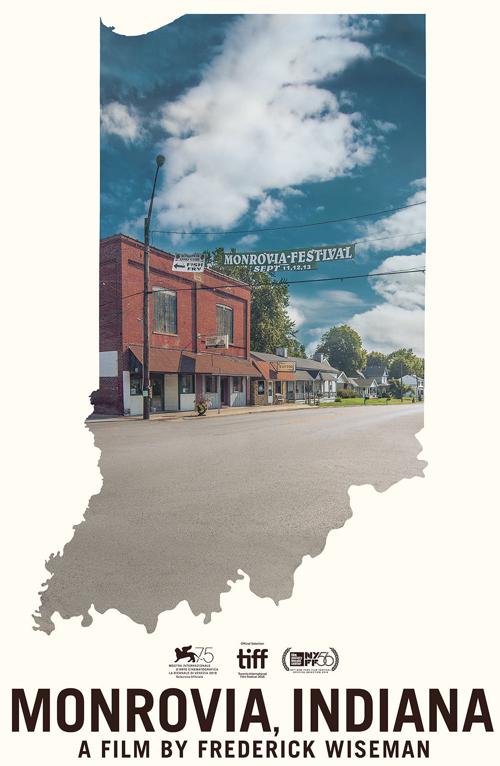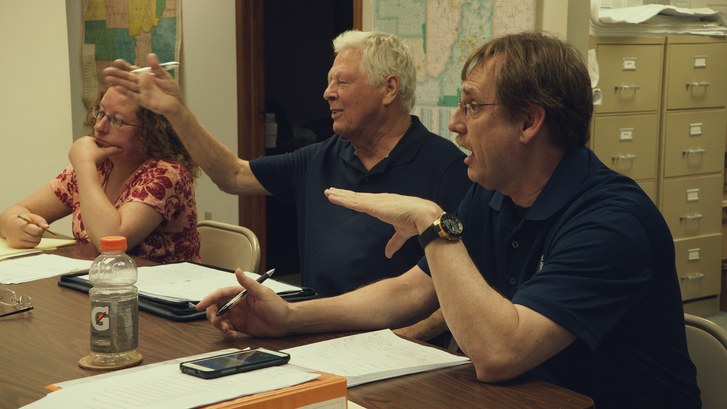Doc Corner: Frederick Wiseman's 'Monrovia, Indiana'
 Friday, November 2, 2018 at 10:00PM
Friday, November 2, 2018 at 10:00PM By Glenn Dunks
 Depending on your point of few, Frederick Wiseman films exist in a realm of apoliticicm or are stealth political missiles. I believe it’s a little bit somewhere in between. It is easy of course to see the markings of a political filmmaker in his works if you know where to look, and can be done so in essentially all of his works from his debut with Titicut Follies in 1967 right up to his most recent works In Jackson Heights and Ex Libris: The New York Public Library.
Depending on your point of few, Frederick Wiseman films exist in a realm of apoliticicm or are stealth political missiles. I believe it’s a little bit somewhere in between. It is easy of course to see the markings of a political filmmaker in his works if you know where to look, and can be done so in essentially all of his works from his debut with Titicut Follies in 1967 right up to his most recent works In Jackson Heights and Ex Libris: The New York Public Library.
And yet he’s obviously no Michael Moore or Alex Gibney, and the way his camera silent observes with little regard for constructed narrative (at least in any traditional sense, although his films all tell a story) means that it is easy for his films to feel as if any political ideology that rises to the form of text is purely accidental.
With a film such as Wiseman’s latest – his 42nd and his seventh this decade – it is once again a little from column a and a little from column b. How much you’re willing to indulge, however, may vary considering the topic of his patiently attentive eye is the town of Monrovia, Indiana, a god-fearing, gun-loving town in America’s rust belt that it’s all too easy to assign the moniker of “T***p Country”.
This places Monrovia, Indiana quite awkwardly alongside In Jackson Heights, his 2015 documentary about the most culturally diverse community in America that practically exploded off of the screen with pride for three hours and ten minutes from the melange of accents, languages, skin colours, nationalities and sexualities. In this one, a person of colour doesn’t appear on screen until the 87-minute mark – itself feeling like something of a political statement accidental or otherwise. Of a film with a (relatively scant for Wiseman) 146-minute runtime, too. The current US President is never mentioned by name, but the gun shows and church ceremonies and the general vibe (to be very un-specific about the whole thing, sorry) gives off the impression that the people here probably wouldn’t be too enamoured by a trip on the subway to Jackson Heights.

But then we get back to Wiseman’s ability to skirt that political divide. There isn’t anything antagonistic about the people he has chosen to film, so whether by accident or not Wiseman is sort of challenging us to observe these people outside of any affiliation. But is that something audiences are even capable of doing? I enjoyed many parts of Monrovia, Indiana, but for the first time (at least in the films of his that I have seen) I found something frustrating in his tact. It’s like spending time with people you suspect are Trump voters, but who don’t say anything horribly racist to your face so maybe it’s you who should feel bad for making assumptions.
While the film certainly isn’t a departure from his usual style, there is something perhaps less inviting this time around. Many of his vignettes, his disconnected observations, are interesting – a town planning board that he returns to frequently is an endless source of interest, and I was particularly intrigued by what appeared to be a travelling mattress salesman, plus a truly surreal tractor auction that made me outright guffaw at its silliness – others feel like they hold the weight of something unspoken about them. Wiseman concludes the film with an extended funeral for a woman named Shirley and if it’s saying something then I’m not entirely sure what it is. If it isn’t saying anything, then it’s a lot of proselytizing when there are surely more interesting things to see in the town (for real, can we go back to the tractor auction?). I didn't learn anything surprising about Monrovia, which is something Wiseman's style so often allows for; minor observations abiout a subject that feel like revelations.

Or course, this is about as mixed on a Wiseman film as you’re ever going to see me get. I admire his form and his style so much, especially as documentary evolves and more emphasis gets put on metaphorical bells and whistles. There is something extremely pure about his works, even this one despite my occasional misgivings. As a filmmaker, Wiseman has such deep interest in his subjects, and a compassion too, that easily extends into the audience. But there is something ever so slightly amiss here. His style allows him to (wisely) avoid the nostalgia that often injects itself into these small town portraits, and there is certainly nothing here that feels misrepresentative of a town like this. The town doesn't put on a facade. But while Wiseman may choose to be partisan in his filmmaking, we unfortunately live in a world where that is becoming increasingly hard to abide by. And Monrovia, Indiana – and, presumably Monrovia, Indiana itself – suffers somewhat because of it by coming across as more surface-entry than his works often are.
Release: Currently in limited release and will no doubt air on PBS soon followed by streaming on Kanopy.
Oscar Chances: Ex Libris finally brought Wiseman to the finalist short-list, but couldn't go all the way to a nomination. I doubt Monrovia will fare better, especially now that he has an honourary Oscar and they don't necessary need to be hassled into giving the aging legend a career nomination. It feels like there are more pertinent documentaries in the race this year.



Reader Comments (3)
As a resident of Indiana, I can not for the life of me figure out why he would pick Monrovia. If he was truly curious about the Hoosier state then perhaps he should have turned his eye to Indianapolis: The lone blue spot in a state that bleeds red. I can guarantee it wouldn't have taken 87 minutes to get to a person of color either....
As a staunch liberal myself, it’s still a bit frustrating to read such a shortsighted, prejudiced sentence like this one:
“It’s like spending time with people you suspect are Trump voters, but who don’t say anything horribly racist to your face so maybe it’s you who should feel bad for making assumptions.”
Just to be clear, it is ABSOLUTELY you that should feel bad, my guy. That sentiment is a clear and sad example of what divides us as a country. “I like this person, but I have a feeling he voted for Trump, so... fuck him!” It’s idiotic and you’re just better than that.
I voted for Hilary and cannot wait for the end of Trump’s term. That doesn’t mean that I have to view those that disagree with me as the enemy. Nathaniel has built this site as a beacon for inclusion and while it leans liberal, I’ve always believed other viewpoints were welcomed. You have a large opportunity to write for a site that has a ton of eyes checking in daily- take that responsibility a little more seriously, won’t you?
Silence = deafening